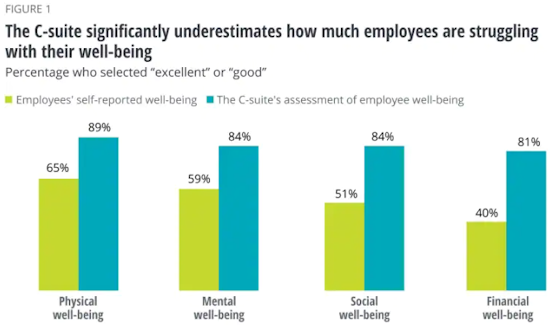The C-suite's role in well-being
Struggling to Prioritize Workforce Well-Being & Quality of Life
Huge
Disconnect Between the C-Suite & Employees
'C-suite May Soon Join the Great Resignation'
C-suite
executives themselves are not immune.
Deloitte and Workplace Intelligence finds nearly 70% of executives are seriously
considering quitting their roles for a job that better supports their
well-being.
There’s no question that well-being is at the top of the C-suite agenda right
now. While the pandemic brought worker safety into the spotlight, there’s also
been an increased focus on the overall poor state of workforce well-being and
the role that organizations play in determining quality of life for employees
and their families.
It turns out that is' not just employees who are struggling at work, it's
executive-level business leaders as well. This came to light in a
Deloitte survey,
released on June 22, which was done in collaboration with independent research
firm Workplace Intelligence. The survey of 2,100 employees and C-level
executives in four countries: U.S., UK, Canada, and Australia, explores the
C-suite’s role in organizational well-being and examines how an overall poor
state of health is affecting retention for workers and executives alike.
The report discovered that
57% of employees and nearly
70% of the C-suite said they are seriously considering quitting
for a job that better supports their well-being.
Despite this mutual struggle, the
C-suite largely doesn’t
recognize that workers are struggling
with their well-being, and this disconnect has the potential to further feed
into The Great Resignation if leaders don’t do more to understand the needs of
their workers and demonstrate that they truly care about their holistic
well-being.

Key findings from the report
include:
●
People’s jobs are harming
their well-being, and many say they will eventually quit as a result.
Significantly, 63% of employees and 73% of the C-suite report that their job
doesn’t allow them to take time off from work and disconnect. Results also show
that for 68% of employees and 81% of the C-suite, improving their well-being is
more important to them than advancing their career right now.

●
The pandemic has worsened
everyone’s health, but executives don’t realize how much their employees are
struggling — Around 1 in 3 workers and executives “always” or “often” feel
exhausted, stressed, overwhelmed, lonely, or depressed.
●
Despite their own struggles
with well-being, executives are significantly overestimating how well their
employees are doing and how supported they feel by their leaders.
●
The C-suite must take greater
ownership and action around matters of health.
Jen Fisher, Deloitte’s
U.S. chief well-being officer, said in a statement. “It’s
time for the C-suite to become more health-savvy
by embracing the expanding focus on well-being in their role. This critical
shift will not only benefit their own well-being and the well-being of their
people, but also the long-term success of their organizations.”
Fortunately, our research confirmed that health-savvy executives have the
ability to turn things around and reimagine well-being for themselves and their
people. But it won’t be easy, and they should consider relying on other leaders
and health experts to help chart a new path forward for well-being at work.
Many employees don’t feel that their executives have been supportive during the
pandemic—but the C-suite sees things much differently. For example,
only 47% of workers believe
their executives understand how difficult the pandemic has been for them, yet
90% of the C-suite say they do recognize how challenging it’s been.
Perhaps
most alarmingly,
we discovered that
only 56% of employees think
that their company’s executives care about their well-being.
However, the C-suite sees things in a much different light:
Ninety-one percent believe
that employees feel their leaders care about them. It’s a notable gap, one that
the C-suite must work to address.
Well-being is a top priority
right now, but there’s one major obstacle: Work
Despite the ongoing challenges of the pandemic—or even partly because of
them—people across the globe are laser-focused on their health in 2022. The vast
majority of respondents (91%) have goals for their well-being, and
75% of employees and 89% of
the C-suite say that improving their well-being is a top priority
for them this year. Most people noted that right now,
this is more important to them
than progressing their career!
ehstoday.com
deloitte.com
Related from Hrdive.com - 6/28/22: Fewer workers
say their employer is empathetic in 2022